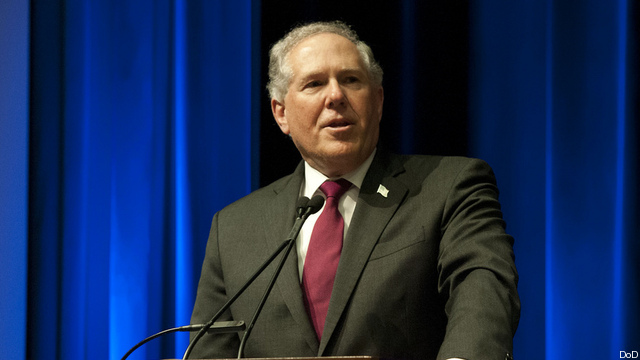ATL Frank Kendall: Sequestration ‘Unconscionable’; Endorses PBLs
Posted on
 NEW YORK: “It is utterly unconscionable — utterly unconscionable — that Congress will allow sequestration to go on.”
NEW YORK: “It is utterly unconscionable — utterly unconscionable — that Congress will allow sequestration to go on.”
Those are the words of Frank Kendall, the Pentagon’s head of acquisition, speaking to an audience of several hundred New York financial types. Kendall is just back from a trip to Afghanistan and he had heard from soldiers there who worried they would be furloughed if sequestration goes through. They won’t be — military personnel salaries are exempted from sequestration, so only federal civilians will be affected — but worry and uncertainty can weaken any organization, and Kendall was visibly angry as he spoke.
But sequestration wasn’t the only issue on Kendall’s agenda at yesterday’s conference on the aerospace and defense sector put on by the Cowen Group.
Kendall told the audience of several hundred Wall Street financiers that he planned to push for more competitive prototyping, more Performance Based Logistics (PBL) contracts, and more of the wide array of acquisition reforms the Pentagon groups under the rubric Better Buying Power 2.
The most controversial part of that package is the renewed focus on PBL, especially in light of the potentially enormous PBL contract that could be awarded for support of the F-35 Joint Strike Fighter. Industry has been pushing hard for more PBL contracts, which they have argued save the government substantial amounts of cash and keep U.S. forces ready to rock and roll.
“There were a couple of cases where this did not work, but generally [a PBL] saves us about 15 percent,” Kendall said. I asked him about an F-35 PBL, and he noted there had been an industry day recently on JSF sustainment. In a clear signal to anyone interested in bidding, Kendall said: “We are examining ways to reduce the sustainment costs of JSF.” Given that the GAO has estimated those costs could force the life cycle costs of the aircraft’s three variants up to $1 trillion over the half-century life of the F-35, that isn’t really surprising. (Note that Lockheed and others in industry think the GAO estimate is absurd and does not take into account allied participation in the program or cost savings from the highly automated and predictive maintenance systems built into the new weapon system.)
In another sign that the Pentagon really is worried about the effects of sequestration and the coming drawdown, Kendall told the Cowen audience that he wanted to see “more competitive prototyping.” As budgets draw down and program starts slow to a crawl, it will become more difficult for industry to keep advanced design teams together.
“I’m really just floating an idea,” Kendall said, but he made clear as well that he’d like to see design teams working on elements of the next generation fighter — which doesn’t yet exist as a program, at least in the white world. The acquisition czar said he does not want to face a fighter monopoly for the next quarter century or more and hopes to keep alive central elements that make competition possible.
Finally, the head of Pentagon acquisition told the financial community that he and Deputy Defense Secretary Ash Carter think there is no pressing need for consolidation among the prime contractors who dominate the defense market. The market will rule, Kendall said, but the contraction of the ranks of defense companies after the end of the Cold War “probably puts us where we ought to be.”
He is “more worried about the survival of smaller firms,” which are often responsible for many of the industry’s new technologies and processes.
And then, of course, there’s sequestration and the Continuing Resolution and congressional gridlock and….well, we’ll just let Kendall get back to work.
Subscribe to our newsletter
Promotions, new products and sales. Directly to your inbox.
